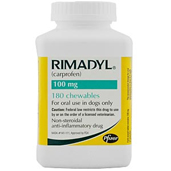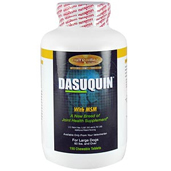A dog's joints undergo a lot of wear
and tear over the course of his life. Injuries, obesity, anatomical
abnormalities, and advancing age can all contribute to the damage.
Whether your dog has been diagnosed with joint disease or you are simply
looking for a way to maximize his mobility, learning about canine joint
health only makes sense.
"Many pets suffering from degenerative joint disease benefit from weight loss, physical therapy, massage, cold laser treatments, acupuncture, and stem cell regenerative therapy."
What Is Canine Arthritis?
The word "arthritis" means
inflammation of a joint. Arthritis can have many causes, but the
most common form in dogs occurs when cartilage within the joint breaks
down under stress, the protective nature of joint fluid declines, and
bony growths develop around the joint in an attempt to stabilize it. This is called degenerative joint disease (DJD) or osteoarthritis.
Dogs that have DJD often:
- Favor their most severely
affected legs
- Are stiff and sore
- Have difficulty rising,
climbing and jumping
- Are reluctant to exercise
- Lose muscle mass
Veterinary Care for Dogs With Arthritis
Veterinarians can usually diagnose
degenerative joint disease based on a dog's age, history of any musculoskeletal
injuries or developmental diseases, a physical exam, and x-rays of the
joints in question. Getting an accurate diagnosis is important
because other diseases that require different forms of treatment can
have symptoms that are very similar to those seen with osteoarthritis.

Many treatment options for DJD are available, and your vet can help you determine which is best for your
dog. Non-steroidal anti-inflammatory drugs (NSAIDs),
for example Rimadyl or Deramaxx, are commonly prescribed because of their
anti-inflammatory and pain relieving properties. Other pain relievers may be used in conjunction with or in place of NSAIDs if a dog needs
more aggressive pain relief or suffers from unacceptable side effects of NSAID use.
Nutritional
supplements have a widely recognized role in the treatment of DJD. Several substances have
been shown to help dogs with DJD including:
- Glucosamine
- Chondroitin
- Methylsulfonylmethane (MSM)
- Avocado Soybean Unsaponifiables (ASU)
- Omega-3 fatty acids
- Antioxidants
Some dog foods now even contain one
or more of the ingredients listed above. If oral supplements don't
seem to be working, an injectable product called Adequan contains an active ingredient similar to
glucosamine, which seems to be more effective for some individuals.
Many pets suffering from degenerative
joint disease benefit from weight loss, physical therapy, massage, cold
laser treatments, acupuncture, and stem cell regenerative therapy.
In most cases, combination therapy, for example using an NSAID, nutritional
supplement and acupuncture
together, does a better job than any one therapy alone. DJD is
a progressive disease and as such, treatment plans that work initially
may need to be "tweaked" as a dog's condition worsens over time.
If all else fails, surgery to remove or replace a severely damaged joint
may be the best option.
Prevention

Completely preventing arthritis is usually
not possible if a dog has enough risk factors, but owners can do a lot
to delay its onset and slow its progression.
Keep your dog slim and in good shape.
Excess body fat puts extra stress on joints and may contribute to the
development of DJD in other ways as well. Strong muscles, tendons
and ligaments all help to support joints.
Pet medications are very safe
and can be given to dogs over long periods of time without worry.
Therefore, you do not have to wait until your dog is showing symptoms
of DJD to start him on one of these formulations. Many products
combine several active ingredients. For example, Dasuquin contains glucosamine, chondroitin, and ASU.
If after a month or so, you are not pleased with your dog's response
to one brand of joint protectant, try a different manufacturer's product.
The above is provided for information purposes only and should not be used for the diagnosis or treatment of any condition.
This information does not cover all possible variables, conditions, reactions, or risks relating to any topic, medication, or product and should not
be considered complete. Certain products or medications may have risks and you should always consult your local veterinarian concerning the treatment of
your pet. Any trademarks are the property of their respective owners.